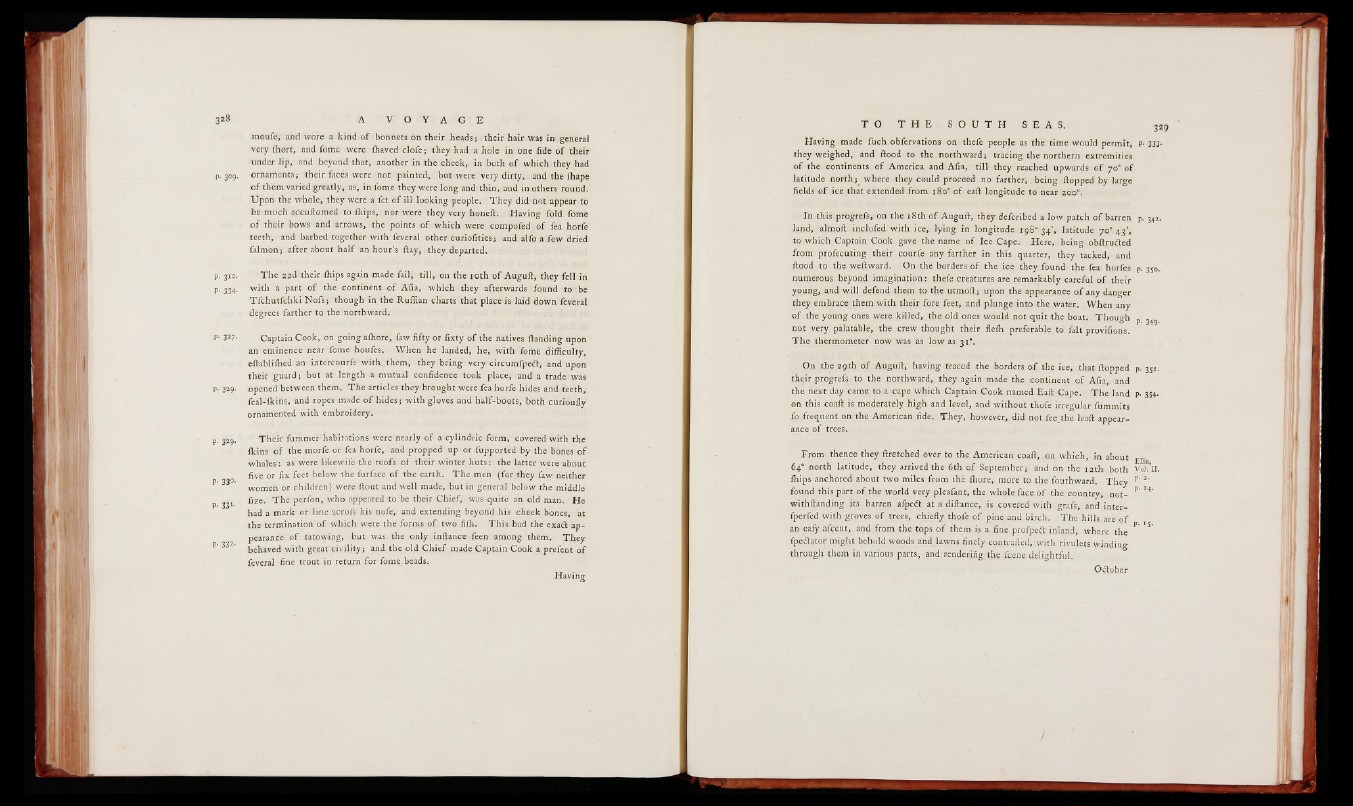
p. 310.
P- 334*
P- 327*
p. 329-
p. 329.
p. 330.
p. 33*.
P- 332'
moufe, and wore a kind of bonnets ón their heads? . their hair was in general
very ihort, and fome were fhaved clofe; they had a hole in one fide o f their
under lip, and beyond that, another in the cheek, in both of which they had
ornaments j their faces were not painted, but were very dirty, and the fhape
of them varied greatly, as, in fome they were long and thin, and in others round.
Upon the whole, they were a fet of ill looking people. They did not appear to
be much accuflomed to ihips, nor were they very horiefl. Having fold fome
o f their bows and arrows, the points of which were compofed of fea horfe
teeth, arid barbed together with feveral other curiofities; and alfo a few dried
falmon? after about half an hour’s ftay, they departed.
The 22d their ihips again made fail,; till, on the 10th of Augufl, they fell in
with a part of the continent of Afia, which they afterwards found to be
Tfchutfchki Nofs; though in the Ruffian charts that place is laid down feveral
degrees farther to the northward.
Captain Cook, on going aihore, faw fifty or fixty of the natives flanding upon
an eminence near fome houfes. When hè landed, he, with fome difficulty,
eflablifhed an intercourfe witKjhem, they being very circumfpeft, and upon
their guardj but at length a mutual confidence took place, and a trade was
opened between them. The articles they brought were fea horfe hides and teeth,
feal-fkins, and ropes made of hides ; with gloves and half-boots, both curioully
ornamented with embroidery.
Their fummer habitations were nearly of a cylindric form, covered with the
ikins of the morfe or fea horfe, and propped up or fupported by the bones of
whales: as were likewife the roofs of their winter huts : the latter were about
five or fix feet below the furfaee of the earth. The men (for they faw neither
women or children) were ftout and well made, but in general below the middle
fize. The perfon, who appeared to be their Chief, was quite an old man. He
had a mark or line acrofs his nofe, and extending beyond his cheek bones, at
the termination of which were thè forms of two fifh. This had the exadt appearance,
o f . tato wing, but was thè only inflance feen among them. They
béhavèd with great civility; and the old Chief made Captain Cook a prefen t of
feveral fine trout in return for fome beads.
Having
Having made fuch obfervations on thefe people as the time would permit, P- 333.
they weighed, and flood to the northward; tracing the northern extremities
o f the continents of America and Afia, till they reached upwards of 70° of
latitude north; where they could proceed no farther, being flopped by large
fields of ice that extended from 1800 of eafl longitude to near 200°.
In this progrefs, on the 18th of Augufl, they defcribed a low patch of barren p. 342.
land, almofl inclofed with ice, lying in longitude 198° 34’, latitude 70° 43’,
to which Captain Cook gave the name of Ice Cape. Here, being obflrudted
from profecuting their courfe any farther in this quarter, they tacked, and
flood to the weflward. On the borders of the ice they found the fea horfes p. 350.
numerous beyond imagination : thefe creatures are remarkably careful of their
young, and will defènd them to the utmofl; upon the appearance of any danger
they embrace them with their fore feet, and plunge into the water. When any
o f the young ones were killed, the old ones would not quit the boat. Though p 34g
not very palatable, the crew thought their flefh preferable to fait provifions.
The thermometer now was as low as 31*.
On the 29th of Augufl, having traced the borders o f the ice, that flopped p. 351.
their progrefs to the northward, they again made the continent of Afia, and
the next day came to a cape which Captain Cook named Eafl Cape. The land p- 354.
on this cóafl is moderately high and level, and without thofe irregular fummits
fo .frequent on the American fide. They, however, did not fee the leafl appearance
of trees.
From thence they flretched over to the American coafl, on which, in about EI].
64° north latitude, they arrived the 6th of September; and on the 12th both Vol.’ll,
ihips anchored about two miles from thè fhore, more to the fouthward. They p* 2‘
found this part of the world very pleafant, the whole face of the country, not- P I4’
withflanding its barren afpedl at a diilance, is covered with grafs, and inter-
fperfed with groves of trees, chiefly thofe of pine and birch. The hills are of
an eafy afcent, and from the tops òf them is a fine profpedt inland, where the P
fpedlator might behold woods and lawns finely con trailed,'with rivulets winding
through them in various parts, and rendering the fcene delightful.
Odtober
Ì